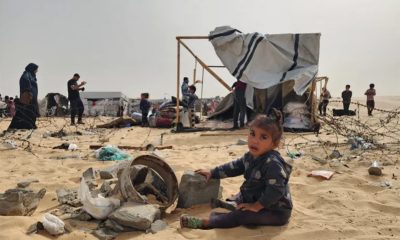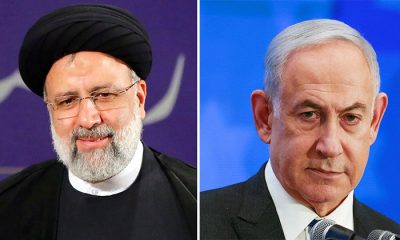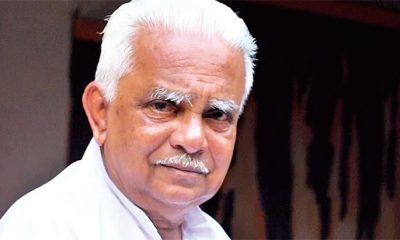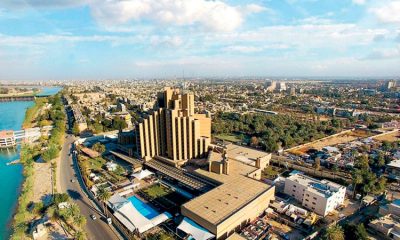Features
Defeating despair in the face of rising world disorder

 That rampant disorder is the starkest of global realities currently is a fact beyond dispute. While the international community is confronted with the grueling challenge of stemming such runaway disorder, an equally exacting undertaking for the world is the need to keep up its spirits in this uphill task of bringing order out of chaos.
That rampant disorder is the starkest of global realities currently is a fact beyond dispute. While the international community is confronted with the grueling challenge of stemming such runaway disorder, an equally exacting undertaking for the world is the need to keep up its spirits in this uphill task of bringing order out of chaos.
However, before getting down to any major ‘damage control’ initiatives or ‘saving acts’ in relation to the contemporary world, governments and publics would need to gain increasing clarity on the present pervasive issues in global politics. That is, educating and enlightening these sections emerge as principal needs and it is up to universities, higher educational institutions, research organizations, progressive think tanks and the like to take on these challenges.
Of the tertiary level educational institutions in Sri Lanka that have boldly and resourcefully taken on such tasks, the Bandaranaike Centre for International Studies (BCIS), Colombo, has been among the foremost. On May 14, 2024, the BCIS once again proved its capabilities in this regard when it held a largely attended and lively forum titled, ‘Multilateralism and Diplomacy for Peace’.
Under BCIS Chairperson, former President Ms. Chandrika Bandaranaike Kumaratunga and its Executive Director, Professor Emeritus Gamini Keerawella, the path-breaking nature of such BCIS initiatives has been increasingly in evidence in recent times. Panelists at the forum were, Ambassador of Japan to Sri Lanka Hideaki Mizukoshi and Resident Coordinator of the United Nations, Sri Lanka, Marc-Andre Franche. The forum was moderated by Member/Council of Management of the BCIS, Dr. Radhika Coomaraswamy.
Admitting that it is ‘difficult not to feel cynical today’ in the face of the world’s rising disorder and insecurity, Amb. Franche pointed out that multilateral institutions have not taken on current challenges effectively. For example, the UN Security Council’s dysfunctional nature in the face of present day global law and order issues has never been greater.
While it is difficult, Amb. Franche explained, to be optimistic currently, the UN has, nevertheless, forged ahead to the best of its ability to maintain world peace. It has prevented nuclear wars and helped in the socio-economic progress of countries to the extent possible. Moreover, the UN has been placing an emphasis on conflict prevention, mediation and the transformation of global peace operations in recent times.
It was Amb. Franche’s submission that the threats facing peace are vastly different today. However, the UN Secretary General Antonio Guterres has stuck to his task of being ‘the Conscience of the World’. In a historic statement recently Guterres called for a ‘New Social Contract between states and peoples, based on trust, inclusion and human rights, along with women’s active participation in all social segments.’
Ambassador Mizukoshi, among other things, pointed out that since Japan joined the UN in the mid-fifties, it has been dominant in the area of international cooperation and the socio-economic advancement of peoples.
Cooperating in advancing international peacekeeping and taking up in a major way global humanitarian relief operations, Japan has been prominent in even assisting Sri Lanka on a number of fronts. For example, in the early 2000s, Japan played a major role in conflict resolution and peace-building in Sri Lanka. Currently, it is in the forefront of Sri Lanka’s debt restructuring effort as a principal facilitator.
Japan, it was pointed out, is for peace and stability in the Asia-pacific region. It also actively supports peace diplomacy since international peace is high among its priorities.
The BCIS forum threw-up many a thought-provoking issue in current world politics for Sri Lanka and the world. It was a stimulant to fresh thinking on how the world community could forge ahead with meeting the challenge of fostering conflict-resolution and peace. This task is of the utmost importance because many are the observers who are likely to succumb to a mood of despair on seeing the increasingly aggravating lawlessness the world over.
However, it is important to point out that all peace hopes are not lost. It is particularly important that the UN Secretary General and his vast team ensure that the spirit of peace and reconciliation remains alive in them.
Although it is true that the UN system could be found to be inept in the Ukrainian and Gaza theatres in particular, the UN would do well to perceive that it still retains the initiative on the peace-building front. Its options continue to be ample and now is the time for the system to redouble its efforts to exploit them patiently and discreetly.
The unique strength of the UN is its ability to plod along with providing material and emotional assistance to the needy of the world on a non-discriminatory basis. These efforts have not and are unlikely to produce positive results in the near future but by being constantly there for the deprived the UN could inspire the needy with the hope that all is not lost for them in terms of bettering their lot eventually and blossoming into relatively stable persons and communities.
With time, such wholesomeness and stability could lay the basis for enlightened, democratic thinking among the social segments concerned. But the world would need to wait with immense patience until these welfare efforts of the UN bear fruit. There are no short cuts to bringing into being wholesome, democratically-inclined individuals and communities.
Besides providing nutritious food to the poor, the UN needs to work untiringly towards meeting the educational needs of the deprived. The long-term consequence of such efforts is the coming into being of democracy-conscious persons and communities. Thus, UN personnel cannot afford to give in to a mood of despair.
But there is no underestimating or denying the heartburn of those sections that want to see an improvement in the present lawlessness. A primary cause for such disenchantment is the irresponsible, reckless conduct of the foremost powers. Their agony is compounded by the fact these powers are permanent members of the UN Security Council.
There is the case of the US, for instance, which touts itself as the ‘World’s mightiest democracy’. However, it has done precious little to bring the Israeli state to the negotiating table over the issues in the Gaza. But on this question too all is not lost. Recently, apparently in reaction to increasing protests at home, the Biden administration had delayed some arms shipments to Israel.
Apparently, protests by democratic forces could make a dent in the conduct of governments that are committed to supporting repressive states. Much more needs to be done by the US, of course, to enable a negotiated settlement to solidify itself in the Middle East, but we have some proof in the US decision that democracy-inclined societies provide the best hopes for the world’s betterment. Thus, is the UN vindicated by plodding on with the task of fostering the wellbeing of the deprived the world over. Such efforts provide the fundamental basis for highly literate and democratic societies.
Features
Prosecutorial Vs. Victim-based approaches to accountability
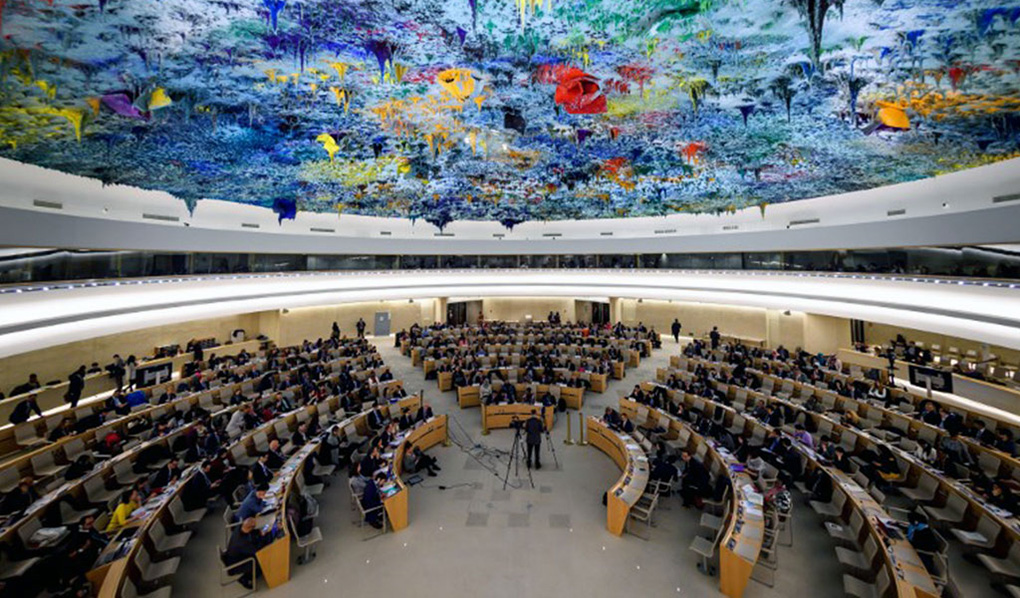
by Neville Ladduwahetty
A report in The Island (May 20, 2024) states that the UN human rights office has “criticised the Sri Lankan government’s failure to acknowledge and hold accountable the perpetrators of tens of thousands of enforced disappearances … Authors of the report also accuse the Liberation Tigers of Tamil Eelam of “engaging in abductions” which were described as “tantamount” to enforced disappearances” (May 20, 2024). Continuing, the report adds that the UN. The High Commissioner for Human Rights had stated: “Accountability must be addressed. We need to see institutional reform for reconciliation to succeed”.
In the meantime, the Secretary General of Amnesty International (AI) had “called for Sri Lanka to be referred to the UN Security Council and subjected to international war crimes inquiry when she participated to pay tribute to those who perished at Mullivaikkal. While the call for Sri Lanka to be referred to the Security Council may have pleased those who came to pay tribute, the reality is that such a referral would inevitably be vetoed. However, the fact remains that AI along with the UN Human Rights is advocating a prosecutorial approach to Accountability.
For instance, the Nuremberg Trial was strictly prosecutorial. In contrast, the Marshall Aid Plan was Victim based. While the objective of the former was to seek justice for the victims by prosecuting the perpetrators of the crimes, it was the latter that enabled Germany to recover and join the community of nations as a powerful and respected member.
The question that divides scholars and others who pursue accountability is; which approach to adopt. Should it be prosecutorial or victim based? While some, such as the UN report cited above advocate a prosecutorial approach for the sake of justice, others such as the High Commissioner are non-committal as to which approach to adopt. Yet, others want some aspects of both approaches. Therefore, the first question to be addressed is which approach to adopt, taking into account the particularities of the Sri Lankan society and the background that led to the armed conflict.
ESTABLISHING the CONTEXT
At a fundamental level, the raison d’etre for the armed conflict was the deep sense of grievance felt by the Tamil community; a circumstance they believed could only be overcome by resorting to an armed conflict to establish a separate state for themselves. For those representing the State of Sri Lanka, their bounden duty was to protect and preserve the territorial integrity of their cherished unitary state in keeping with Article 3 of Protocol II that state: “Nothing in the Protocol shall be invoked for the purpose of affecting the sovereignty of a State or the responsibility of the government by all legitimate means to maintain or re-establish law and order in the State or to defend the national unity and territorial integrity of the State”. The only means by which these vastly contending positions could be resolved was through an armed conflict; a fact recognized by the UN Human Rights Commission in paragraph 182 and 183 of their OISL report of 2015.
Pargraph 182 states: “Article 3 common to the four Geneva Conventions relating to conflicts not of an international character is applicable to the situation in Sri Lanka, with all parties to the conflict bound to respect the guarantees pertaining to the treatment of civilians ….”
Paragraph 183 states: “In addition, the government and armed groups that are parties to the conflict are bound alike by the relevant rules of customary international law applicable in non-international armed conflict”.
Therefore, if both the Sri Lankan State and the LTTE “are bound alike” by the relevant rules of customary international law applicable in non-international armed conflict”, why is all the attention to address accountability ONLY fixated on the Sri Lankan State and none on the LTTE. Since most of those who perished in Mullivaikkal were victims of the policy adopted by the LTTE to take civilians hostage, and continue to endanger the security of hundreds of thousands taken hostage by continuing to engage in hostilities, should NOT the LTTE also be held accountable? This being the case, would the evidence gathering that is currently being undertaken by the UNHRC in order to exercise Universal Jurisdiction, also apply to policies such as hostage taking and shooting escapees?
PROSECUTORIAL APPROACH
Judging from the attention given ONLY to the government of Sri Lanka by the UNHRC and by entities such as AI, the outcome of any judicial processes would be skewed, which means NO justice, despite the fact that the Sri Lankan Government and the LTTE “are bound alike” by relevant rules of customary international law as in common Article 3 and Protocol II; a fact confirmed below.
INTERNATIONAL COURT OF JUSTICE, Judgment of 27 June 1986,
(NICARAGUA v. UNITED STATES OF AMERICA), MERITS
Judgment – para. 215 to 292
“The conflict between the contras’ forces and those of the Government of Nicaragua is an armed conflict which is “not of an international character”. The acts of the contras towards the Nicaraguan Government are therefore governed by the law applicable to conflicts of that character; whereas the actions of the United States in and against Nicaragua fall under the legal rules relating to international conflicts. Because the minimum rules applicable to international and to non-international conflicts are identical, there is no need to address the question whether those actions must be looked at in the context of the rules which operate for the one or for the other category of conflict. The relevant principles are to be looked for in the provisions of Article 3 of each of the four Conventions of August 12, 1949, the text of which, identical in each Convention, expressly refers to conflict not having an international character” (ICJ Judgment, Nicaragua v. U.S para 215 – 292)
“In the Military and Paramilitary Activities in and against Nicaragua, the International Court of Justice observed that the acts of the Contras, fighting against the Nicaraguan Government, were governed by the law applicable to armed conflict not of an international character i.e. Common Article 3. Similarly, in the Tublada case, the Inter-American Commission considered”: Common Article 3’s mandatory provisions expressly bind and apply equally to both parties in internal conflicts, i.e. government and dissident forces. Moreover, the obligation to apply Common Article 3 is absolute for both parties and independent of the obligation of the other. Therefore, both the MTP attackers [the armed opposition group fighting in the conflict under consideration] and the Argentina armed forces had the same duties under humanitarian law” (Zegveld, Accountability of Armed Opposition Groups in International Law, p.21, ICJ Judgment Nicaragua v. US para 119 and Case No. 11/137).
Judging from the ICJ opinions cited above, it is certain that not only violations by the Sri Lanka Government but also violations perpetrated by the LTTE should be reviewed in the course of a Judicial Trial, since they are “bound alike”. Therefore, although violations by the Government forces and LTTE would be judged by Common Article 3, the fact remains that the leadership of the LTTE who ordered the taking of 300,000 plus civilians, hostage is not among the living or has disappeared, and cannot be subjected to a trial despite the fact that the act of taking civilians hostage amount to a war crime and a crime against humanity. Thus, the exercise of gathering evidence against Government perpetrators pales in significance compared with endangering the security of 300,000 plus civilians that were taken hostage. Despite this, a prosecutorial process would mean a skewed outcome of any trial because of the strong possibility that violations perpetrated by the Sri Lankan Government would dominate the trial.
Thus, while a few of those associated with the LTTE would have to face prosecution, the majority cannot be located or identified since they have acquired new identities and are domiciled in foreign countries. Also, others who were in positions to exercise command responsibility, but are no longer among the living cannot be prosecuted for the crimes committed, e.g. taking 300,000 civilians hostage and killing those who attempted to escape.
Under circumstances where it would be next to impossible to identify and prosecute former members of the LTTE because they are dispersed primarily in the West with fresh identities, a prosecutorial approach would lead to an asymmetric outcome resulting in the polarization of the two communities to a degree that could give cause for instability and even resumption of hostilities since the numbers associated with successive Governments who could be identified and prosecuted would significantly be more.
Furthermore, while it would be possible to identify those associated with the Government responsible for command, it is NOT possible to identify the leaders of the LTTE who were responsible because they are no longer among the living.
The net effect of such an asymmetric outcome following a prosecutorial process would permanently damage the efforts advocated and undertaken to bring about reconciliation.by successive Governments. For the UNHRC to include the provision in several of its Resolutions that “a credible justice process should include independent judicial and prosecutorial institutions….”, is because their perception is based on the premise that prosecuting the guilty would foster reconciliation.
While such a premise may be applicable to normal law and order situations, it is NOT applicable to Sri Lanka’s armed conflict that spanned three decades involving two communities if the prosecutorial process causes disproportionate outcomes as referred to above. Furthermore, if the outcome is such that more from the Sinhala majority community is prosecuted than from the minority Tamil community for whatever reason, the consequences would be to seriously setback the reconciliation processes; an outcome that defeats what the UNHRC hopes to achieve.
VICTIM BASED APPROACH
The real possibility of such serious outcomes, requires that the scope of the investigation is limited to such a degree that legal prosecution is not possible in the context of Sri Lanka. However, the scope of the investigation could be such that it is possible to establish the body of evidence associated with a particular incident There is strong evidence that the security forces targeted temporary hospitals despite being aware of their location. However, there is also counter evidence that the LTTE directed artillery fire from such locations and moved their ordinance soon after, thus tempting the security forces to target these make-shift hospitals. The investigation would then be limited to what each party to the conflict did in a given situation and not go beyond as to who was culpable to warrant prosecution under the relevant laws. Investigations would thus be a record of actions taken by respective parties to the conflict without delving further to establish which party was responsible for which violation of which laws, Human Rights or Humanitarian.
While this concept takes root, the leadership of both communities should jointly develop mechanisms to address the needs of victims and take joint responsibility for their implementation, instead of depending solely on the elected Government for Reconciliation to be effective and unity restored.
CONCLUSION
In light of the hard reality associated with prosecutorial processes cited above, and the ruling by the International Court of Justice in the case. Nicaragua v. U.S the “acts of the Contras fighting against the Nicaraguan Government were governed by the law applicable to armed conflict not of an international character i.e. Common Article 3…”. Therefore, the approach should be to limit investigations, not with the intent of prosecution because it would be skewed for reasons cited above. but with the intent of recording the events that occurred during the armed conflict, and which party to the armed conflict could be identified with the respective violations with a view to use this body of evidence to institute reforms to prevent recurrence.
It is indeed a matter of serious concern that successive Sri Lankan Governments have failed to acknowledge that the Sri Lankan Security Forces and the LTTE are bound alike by the laws applicable to the armed conflict in Sri Lanka. This has seriously dented addressing issues of accountability in a balanced manner.
At the end of such investigations the present leadership of the parties to the conflict should acknowledge the serious omissions and commissions committed by both parties and move on by declaring the broadest possible amnesty to all who were associated with the conflict as stated in Section 5 of Article 6 of the Additional protocol II of 1977.
Article 6 Section 5 States: “At the end of hostilities, the authorities in power shall endeavor to grant the broadest possible amnesty to persons who have participated in the armed conflict, or those deprived of their liberty for reasons related to the armed conflict, whether they are interned or detained”.
Since such amnesties and pardons have been instituted starting with the release of child soldiers and nearly 11,000 plus former LTTE combatants and more recently the release of prisoners, the practice has been in operation from time to time. This process would have gained momentum if not for the clamour for prosecutorial processes locally and resolutions of UNHRC that are tantamount to External intervention. The need therefore, is to regularize this practice and bring closure to an issue whose time has come.
Features
Stupid politicos and armed cops

 Cassandra was rather starved of grist to her mill when two VIP politicians made some stupid pronouncements, one surely manipulated and the other extempore. Speaking plain, Sri Lanka was blundering along with minor skirmishes which were not worth commenting on by Cass in her Friday Cry when 28 Tuesday gave unto her two incidents which she could go to town on. The press reported both on Wednesday (29).
Cassandra was rather starved of grist to her mill when two VIP politicians made some stupid pronouncements, one surely manipulated and the other extempore. Speaking plain, Sri Lanka was blundering along with minor skirmishes which were not worth commenting on by Cass in her Friday Cry when 28 Tuesday gave unto her two incidents which she could go to town on. The press reported both on Wednesday (29).
Referendum
General Secretary of the UNP, Palitha Range Bandara, made the stupidest statement. He noted with gravitas that due to the economic situation of the country both presidential and parliamentary elections should be postponed for two years, and a referendum conducted to obtain public approval. What he meant was that the motley of MPs of all hues that constitute the present Cabinet of Ministers and government now in power under a President who was NOT elected by the people but named by a run-away Prez to take his place, should continue with a referendum.
Referendums seem to be the plaything of the UNP. The uncle of the present leader of the Greens – J R Jayewardene – known as Tricky Dicky and The Old Fox held a referendum in 1982 to extend the life of Parliament by six years purportedly to continue uninterrupted the massive projects his government had embarked upon.
Most with hindsight heavily criticise JRJ for the referendum but admittedly there were plus points in the government of the day though of course the main reason was not wanting to lose the majority the UNP had or risk a defeat at the polls.
A much younger Cassandra thought the move was good since the Mahaweli Diversion Scheme and other projects were ongoing and the Cabinet was composed mostly of competent, educated persons.
The parlous state of the economy has been given as the reason for Range Bandara’s proposal. The Treasury itself can cough up enough money for elections to be held. Cass need not expand on this.
What Cass immediately thought was that Range Bandara was not outlining his own thought-out idea. He is only a mouthpiece or ventriloquist’s dummy. Now, who is the ventriloquist? I suppose with a strong domineering leader like Ranil W, his underlings do as directed; they won’t publicly air their views as they desire, especially with matters concerning the country’s Constitution.
Scathing comments
All political party leaders and others expressed their views which universally condemned Ranga Bandara and scorned the very mention of a referendum. It was a bit of a surprise to Cass, and I must say pleasant, that even Namal Rajapaksa criticised Bandara’s tentative toe dip to test the waters. Now that it is sure Ranil is not the favoured candidate of the SLPP, its national organiser did not mince his words when he thrashed Bandara. Dr Pakiasothy Saravanamuttu – Executive Director CPA, gave a very succinct explanation as to why a referendum was unconstitutional in this instance. The final judgments were delivered by the Head of PAFFREL, Rohana Hettiaratchi, and Director General of the Election Commission. The latter proclaimed: “The presidential election cannot be put off with the help of a referendum.” So there Mr Range Bandara, the kite you flew while someone else tugged the string, is useless.
Police outnumber protesters twenty to one
Cass strongly feels the Police Department employs far too many personnel. This excess may be due to the usual criterion for recruitment: the political chit – “He is one of our supporters. Give him a job.” There are more than enough crimes of varying degree that an alert, efficient police can prevent from maniacal driving of vehicles to drug related murders. But the number of crimes, more particularly preventable ones, increase in number. Hence, people say: “Where are the police?”
Cass saw two possés of police, one near the Nelum Mawatha SLPP office in Battaramulla on 28 May. There were about 12 protesters. They wanted to convey the message to the ruling party “to refrain from backing President Ranil Wickremasinghe’s bid to enact new laws that are inimical to the country’s interests.” As harmless as that!
Diabolical comment
Yes, a comment that is devilish and to Cass so stupid was made by Minister Prasanna Ranatunge as his car was stalled by the protestors. He just ordered the driver to move on, later commented on it. He accused “The protesting civil society activists that they were trying to cause anarchy for financial benefits.”
Anarchy? That small group of well bred, well dressed, conducting themselves admirably for the sake of the nation, attempting to create “a state of disorder due to absence or non-recognition of authority or other controlling systems.” That is one dictionary definition of anarchy. Cass accepts it here with the modification: absence of proper government authority.” Is our present government, and more so its president, continuing with proper authority?
Who is closer and definitely more capable of causing anarchy – the lot of Cabinet Ministers we now have led by Prasanna R or the protesting couple of ladies and gents? Remember how many of the present government lot created near anarchy in Parliament, their weapons of battle being chilli powder, chilli water and their brute strength.
How sick and depraved this nation’s VIPs are. There are intrepid persons who protest on streets to better matters for us, the citizens.
Features
Global lawlessness and the responsibilities of statehood

 Among the positive fallouts from the recent decision by Norway, Spain and Ireland to recognize Palestinian statehood is an indirect vindication of the much derided ‘Two State solution’ in the Middle East. For those advocating a political settlement in the turbulent region, the latter solution, which recognizes the need for two peacefully coexisting states, is the only rational answer to the long-running dehumanizing conflict.
Among the positive fallouts from the recent decision by Norway, Spain and Ireland to recognize Palestinian statehood is an indirect vindication of the much derided ‘Two State solution’ in the Middle East. For those advocating a political settlement in the turbulent region, the latter solution, which recognizes the need for two peacefully coexisting states, is the only rational answer to the long-running dehumanizing conflict.
Accordingly, sensible sections the world over are likely to endorse Irish Prime Minister Simon Harris’ position, for instance, that recognition of Palestinian statehood ‘is an important step towards permanent peace’ in the Middle East. Hopefully, the example set by the mentioned countries would motivate other states to follow suit.
It could not be stressed enough that more and more of the world’s states need to rally round the ‘Two State’ principle, since mounting international pressure on Israel and its supporters for the implementation of the said formula for peace, is likely to bear some fruit eventually although positive results from the initiative cannot be expected in the short term.
Overwhelming international pressure is likely to make a dent or more on the policy positions of the US, for example, as the conflict evolves and the US has evinced some sensitivity to international opinion of late, although much more is expected of it, considering its strong official commitment to democracy. But hard, patient work lies ahead on the matter of Middle East peace for all quarters concerned.
There is much that those major powers that are seen as ‘Swing States’ could do to take the Middle East in the direction of a peaceful settlement. ‘Swing States’ are those countries that are in a strong position to influence world opinion positively. South Africa, India and Indonesia are three powers that qualify for ‘Swing State’ status currently.
South Africa, for instance, has proved exemplary in this regard. Its initiatives in the International Court of Justice (ICJ) have compelled the latter to call on Israel to ‘immediately halt its military offensive, and any other action in the Rafah Governorate’, which could bring about ‘the physical destruction of the Palestinians.’
This ruling is of a historic nature, considering that the world’s democracies in particular could be from now on compelled to speak out unambiguously against any future Israeli actions that are seen as atrocities. Besides, the ruling would draw their attention to the need to adhere to their professed principles in governance while interacting with the rest of the world. For instance, they could acquire some awareness of the need to avoid ‘double speak’ and hypocrisy in their dealings with the rest of the international community. But here too, immediate positive changes could not be expected internationally.
However, statehood carries important rights as well as responsibilities. While the right to self-determination is integral to national sovereignty and is an inalienable right of states, crucial responsibilities devolve on sovereign states as well and these carry equal weight as rights.
Some of these responsibilities are, the scrupulous observance of International Law, compliance with the Universal Declaration of Human Rights, respectful recognition of the rights of other states, compliance with the requirements of the UN system and notable deference to the principles of multilateralism and international cooperation.
Needless to say, a future Palestinian state would need to carry out these responsibilities, while enjoying in full the rights due to it. Once the final geographical boundaries of Palestine and Israel have been decided upon, ideally with UN mediation, these states would carry the weighty responsibility of living with each other cooperatively and peacefully. Unless the states concerned live up to these expectations, it would be futile to speak in terms of the ‘Two-State Solution’ for the Middle East.
Of course, these requirements apply to Israel too and it would need to prove itself worthy of UN membership, going ahead. Thus far, Israel has left much to be desired in this repect and it is up to its principal international backers, such as the US, to awaken it to its international responsibilities. The US could begin by strongly impressing upon Israel the need to put a halt to its seemingly uncontrollable urge to expand its presence on Palestnian land. In case there is no cooperation on this score by Israel, the US should consider cutting off arms supplies to the former.
Likewise, Palestine’s international backers would need to convince a future Palestnian state of the need to consistently abide by International Law and its prime requirements.
States such as Iran should perceive that it would not be doing the Palestinian cause or the Middle East any good by aggravating current regional tensions, unconditionally backing Palestine and seeking the destruction of Israel.
Peace in the region needs to be premised on Israel’s right to exist and on its right to defend itself, besides the above considerations. If a durable Middle East settlement is to be arrived at, these requirements need to be compoulsorily met and those states that have been advocating Palestinian statehood would need to be specially cognizant of them. Among other things, they would need to rein-in Iran and those regional actors that are supportive of it, since the latter sections stand accused of aggravating the Middle East conflict by staunchly backing militant outfits, such as Hamas.
Accordingly, besides the principal parties to the Middle East problem, their international backers too play a huge role in evolving a durable solution to the long-running conflict. If the Middle East problem has proved intractable thus far, such external quarters too are responsible for this situation of gridlock because their uncritical support for the antagonists has kept the conflict raging.
Therefore, all sections that are of relevance to the Middle East conflict need to come out of their entrenched positions if some progress is to be made towards a settlement. This responsibility cannot be averted anymore because the conflict is taking on increasingly horrific proportions as the days go by.
Right now, humanity is being shamed by the ongoing murderous violence in the Middle East. It is the responsibility of the world community to prove cynics wrong by restoring humanity to its primal dignity in theatres of relentless blood-letting such as the Middle East.
The UN would need to play a principal role in such epochal restoration efforts. It is the responsibility of states and their peoples to re-energise the UN, reinvest it with its former eminence and enable it to play its crucial role as the prime peace-maker of the world.
-

 Business5 days ago
Business5 days agoDSI Tyres hosts Hankook Tyre Dealers’ Gathering at RIU
-

 Sports3 days ago
Sports3 days agoSri Lanka’s Para athletes shine at World Para Athletics Championships
-

 Business3 days ago
Business3 days agoSri Lanka participates in 2024 ‘Impact Harvest Forum’
-

 Sports5 days ago
Sports5 days agoSri Lanka’s fast bowling resources excites Ravi Ratnayake
-

 Features5 days ago
Features5 days agoExciting Events at Babylon Oberoi
-

 Business2 days ago
Business2 days agoDialog launches country’s first smartphone plan available to all Sri Lankans
-

 Editorial5 days ago
Editorial5 days agoNo general election first
-

 Features5 days ago
Features5 days agoTrump posts fake news about “the creation of a ‘Unified Reich’


